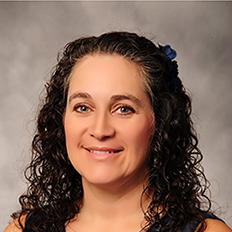
Natural and Applied Sciences
Alesia Hruska
Professor of Biology
Education
- PhD Iowa State University
- BA Luther College
About
After earning her PhD, Hruska worked for five years as an Associate of the Howard Hughes Medical Institute in Dr. Michael Welsh's lab at the University of Iowa.
Professor of Biology Alesia Hruska has been teaching full-time at Mount Mercy since 2007. Hruska completed undergraduate studies with a Bachelor's degree in biology and art, with a minor in chemistry. She then went on to earn a Doctorate in the Department of Biochemistry, Biophysics, and Molecular Biology with a major in Molecular, Cellular, and Developmental Biology. Her teaching areas include Biochemistry, Cells and Molecular Biology, Foundations of Biology and Scientific Inquiry I, and Genetics.
Her research focused on the proteins that interact with the Acid Sensing Ion channels which function in learning and memory and our sense of pain and touch. She served as a visiting lecturer at the University of Iowa and as a visiting assistant professor of biology at Coe College. Prior to joining Mount Mercy full-time, she worked part time and taught biochemistry, genetics and microbiology.
Hruska has authored many publications and abstracts. Her research with undergraduate students at Mount Mercy involves studying protein-protein interactions. One research focuses on the proteins that interact with PICK1, a protein that binds to receptors involved with learning and memory, axonal growth, schizophrenia and cancer.
Hruska also studies the molecular mechanisms that cause the eye disease glaucoma in collaboration with Michael G. Anderson at the University of Iowa. Glaucoma is the leading cause of blindness that affects approximately 70 million people worldwide. Dr. Anderson’s lab identifies mutant genes that cause glaucoma, while Hruska and her students identify protein-protein interactions that are different or missing in organisms with these mutations leading to glaucoma.
Hruska is a member of the Iowa Academy of Science and has served as chair of the Cellular, Molecular, and Microbiology section of the academy. She is also a member of the American Association of Cell Biology. Dr. Hruska has received the Distinguished Iowa Science Teaching Award from the Iowa Academy of Science in 2012. She has also received several R. J. McElroy Student Faculty research grants and was awarded a grant in 2010 from the Carver Trust Foundation to create the Tissue Culture and Undergraduate Research lab on campus.
In her free time, Hruska enjoys cardmaking, scrapbooking, organic gardening, yoga, Tae Kwon Do, SCUBA diving and biking with her family.
Additional Information
Excoffon, K. J. D. A, A. O. Kolawole, N. Kusama, N. D. Gansemer, P. Sharma, A. M. Hruska-Hageman, E. Petroff, and C. J. Benson. 2012. Coxsackievirus and adenovirus receptor (CAR) mediates trafficking of acid sensing ion channel 3 (ASIC3) via PSD-95. Biochemical and Biophysical Research Communications 425: 13 – 18.
Ashbourne, K. J. D., A. Hruska-Hageman, M. Klotz, G. L. Traver. 2004. A role for the PDZ-binding domain of the coxsackie B virus and adenovirus receptor (CAR) in cell adhesion and growth. Journal of Cell Science 117: 4401-4409.
Leonard, A. S., O. Yermolaieva, A. Hruska-Hageman, C. C. Askwith, M. P. Price, J. A. Wemmie, and M. J. Welsh. 2003. cAMP-dependent protein kinase phosphorylation of the acid-sensing ion channel-1 regulates its binding to the protein interacting with C-kinase-1. Proceedings of the National Academy of Sciences 100: 2029 – 2034.
A. M. Hruska-Hageman, C. J. Benson, A. S. Leonard, M. P. Price, and M. J. Welsh. 2004. PSD-25 and Lin-7b interact with acid-sensing ion channel-3 and have opposite effects on H+-gated current. Journal of Biological Chemistry 279: 46962 – 46968.
A. M. Hruska-Hageman, J. A. Wemmie, M. P. Price, and M. J. Welsh. 2002. Interactino of the synaptic protein PICK1 (protein interacting with C kinase 1) with the non-voltage gated sodium channels BNC1 (brain Na+ channel 1) and ASIC (acid-sensing ion channel). Biochemical Journal 361: 443 – 450.